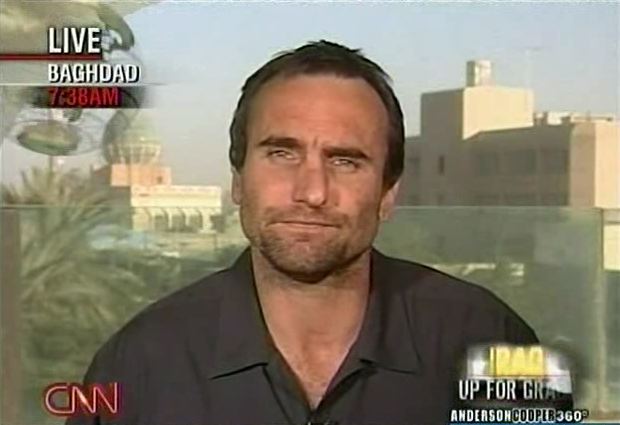AC: "...the fate of the Iraqi intelligence community."

Click photo to play
Length: 5:37
[NOTE: there was an audio glitch in the version that aired during AC360,
so I have dubbed in the version that aired the next day on NewsRoom.]
ANDERSON COOPER: The kind of warfare in the insurgent video that you saw before the break is what we're used to seeing in Iraq, but there's another fight going on behind the scenes. This battle is taking place in the shadows, a quiet struggle for control of Iraq's intelligence agencies, and it is a fight the United States simply cannot afford to lose.
CNN's Michael Ware investigates.
(BEGIN VIDEOTAPE)
MICHAEL WARE, CNN CORRESPONDENT (voice over): This is the face of the intelligence wars here, an Iraqi officer unable to show his identity amid the shambles of his agency's southern headquarters. It was stormed not by Sunni insurgents or Shia militia, but by coalition troops and Iraqi special forces who suspect he's working for another side.
It's a scene far from the other Iraq war on TV screens of roadside bombs, suicide attacks and firefights. This is a conflict waged in the hidden world of espionage, between intelligence agencies sponsored by the CIA and Iran.
It's about who controls Iraqi intelligence. And it's a battle the U.S. risks losing.
It's all here in this document from Iraq's National Security Council. In these pages, the blueprint for the nation's new intelligence community. A blueprint that would merge all intelligence gathering under Iraqi government control, a government heavily influenced by Iran.
It would be a damaging blow to the CIA, which since the fall of Saddam's regime has built its largest station in the world here. U.S. intelligence sources tell CNN the agency has around 500 officers, more than the CIA presence in Saigon during the Vietnam War.
At stake is control of an organization ensconced inside this heavily-defended building, the Iraqi National Intelligence Service, or INIS. It's headed by this man, Mohammed Abdullah Shehwani, a man so secretive, this is one of the few known photographs of him.
Appointed three years ago by the U.S., military and intelligence sources say Shehwani's INIS is funded completely by the CIA. Though an Iraqi agency, not one cent comes from the government in Baghdad.
Top Iraqi government officials complain the agency is beyond Prime Minister Nuri al-Maliki's control. But now the Shia-led government is trying to assert that control.
Shehwani, currently under Iraqi government investigation over unspecified corruption allegations, has not been seen in the country for at least three months. U.S. ally and former prime minister Ayad Allawi says Shehwani is being unfairly targeted.
AYAD ALLAWI, FMR. IRAQ PRIME MINISTER: I don't know whether it's an attack on the U.S. intelligence, but definitely it's an attack, a political attack, against Shehwani.
WARE: One of Shehwani's rivals is this man, Shirwan al-Wa'eli, Iraq's minister for national security, here on a recent tour of Baghdad neighborhoods. He leads the agency that over the past two years, according to U.S. intelligence, has grown to almost 3,000 operatives. The goal: to compete with the CIA. And under the new intelligence plan, this agency is set to grow even more, with the minister applauding his relationship with Iran and distancing himself from the U.S.
SHIRWAN KAMIL AL-WA'ELI, MINISTER OF STATE FOR NATIONAL SECURITY (through translator): Multinational forces are in Iraq. And they're supportive on the security issue. And we have a good relationship with them. But we do not bargain Iraq to any side. The Americans give us only moral support, not logistical support.
WARE: While the CIA-backed agency suffers, this ministry has become an intelligence organization the American government and its allies never meant it to be.
CNN's repeated requests for on-the-record comments from the U.S. military, embassy, and intelligence agencies in Iraq went unanswered.
Meanwhile, the intelligence plan is due to go to the Iraqi parliament. And what happens there may be every bit as important as the battles on the streets of Baghdad.
(END VIDEOTAPE)
COOPER: Michael Ware joins us now from Baghdad.
Michael, how much influence does the Iranian intelligence services have on the Iraqi government?
WARE: Well, this is a great, big, open question, Anderson. Certainly if you speak to Western intelligence or American military intelligence, they will tell you that the Iranian influence is significant, if not great.
Indeed, they point to a myriad of Iranian intelligence and Revolutionary Guard networks operating in Iraq, including some coming out of the Iranian Embassy here in the capital of Baghdad. So their influence cannot be underestimated, Anderson. And this really is an intense rivalry for what is basically the fate of the Iraqi intelligence community.
COOPER: Fascinating report. Michael, thanks. Appreciate it.
Michael Ware from Baghdad.
